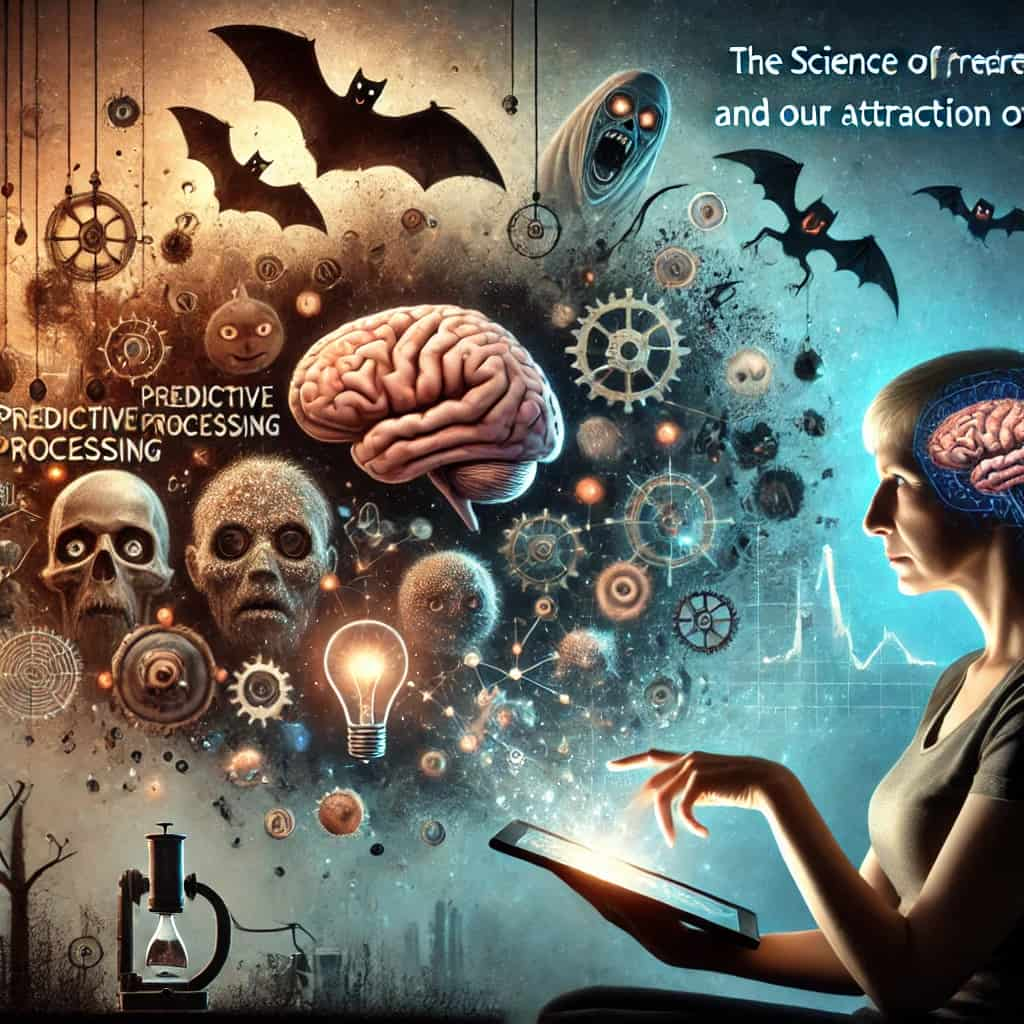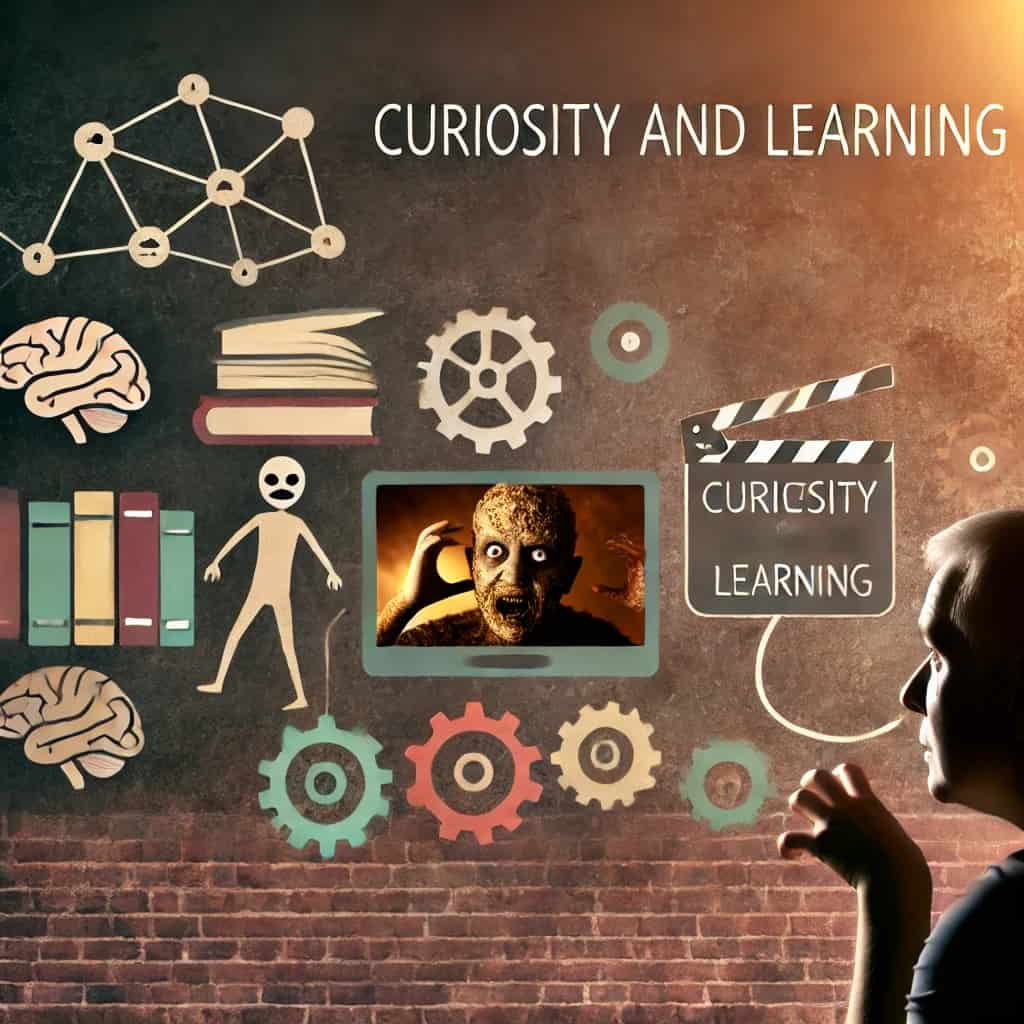If You’re a Horror Fan, Science Has Brilliant News for You! 🧠🎬
Did you know your love for horror movies might be one of the best ways to prepare for life’s unexpected twists and turns? 🎢
Recent research from cognitive scientists like Mark Miller, Ben White, and Coltan Scrivner reveals that watching horror movies acts as a mental workout for your brain. 🧠 Here’s why:
1️⃣ Trains Your Brain to Adapt: Horror movies challenge your brain’s predictive system, forcing it to recalibrate and adapt when unexpected twists and scares occur. This process strengthens mental agility, helping you navigate uncertainty in real life. 🎢
2️⃣ Builds Emotional Resilience: Experiencing controlled fear in a safe environment teaches your brain to manage stress and fear responses, preparing you to face real-world challenges with greater confidence. 🌟
3️⃣ Enhances Focus and Attention: The suspense and unpredictability of horror keep your brain fully engaged, training it to stay sharp and present in the moment. 🎯
This isn’t just about entertainment—it’s science-backed personal growth! 💡 Ready to discover how embracing your love for horror can make you stronger and more resilient? Keep reading! 🧛♂️
🧠 The Science of Predictive Processing and Why Horror Works

How Horror Helps Your Brain Grow
Horror isn’t just thrilling—it’s transformative. Here’s what the science reveals:
- Predictive Processing (PP): The Brain’s Prediction Machine
Your brain thrives on patterns and predictions. Horror disrupts this system with suspense, twists, and surprises, creating “prediction errors.” These moments force your brain to recalibrate and adapt, improving mental agility and helping you navigate uncertainty in real life. 🎢 - Safe Fear Exposure: Building Resilience Without Risk
Watching horror lets you experience fear in a controlled environment. Your brain learns to manage intense emotions like fear and anxiety without real danger, helping you build emotional resilience for everyday stressors. 🧘♂️ - The Thrill of Novelty: Stimulating and Rewarding
Horror combines familiar tropes with unexpected surprises, creating a balance of comfort and excitement. This novelty keeps your brain engaged and curious, providing both stimulation and satisfaction. 🌟
By engaging with horror, we’re not just seeking entertainment; we’re training our minds to handle stress, uncertainty, and change. It’s a workout for the brain—fun, thrilling, and incredibly beneficial! 🧠💪
🌟 The Benefits of Controlled Fear
1. Boosts Curiosity 📚

Horror’s twists and suspense spark curiosity, encouraging exploration and problem-solving. This heightened curiosity prepares you to handle real-world challenges with a sharper, more inquisitive mindset. 🧠✨
2. Strengthens Emotional Control 💪

Experiencing fear in a safe environment teaches your brain to regulate intense emotions. This skill helps you stay composed under pressure, whether you’re facing a tough meeting or an unexpected challenge. 🧘♂️🎬
3. Builds Resilience 🌱

Studies, including research from the COVID-19 pandemic, show that horror fans often handle stress better. Controlled fear trains your mind to adapt to discomfort, boosting confidence and emotional stability. 🧠💪
4. Improves Focus 🎯

Horror demands your full attention, sharpening your ability to stay present and engaged. This improved focus can enhance your performance at work, strengthen relationships, and help you achieve personal goals. 🎯💼✨
Controlled fear isn’t just entertaining—it’s a powerful tool for building focus, resilience, and emotional agility. 🧠💡
🔍 How to Use Horror for Personal Growth
You can harness the transformative power of horror with these practical, science-backed techniques:
📺 1. Start with Your Comfort Zone

Start with horror content that feels manageable—whether it’s novels, podcasts, or mild thrillers. Avoid jumping into intense horror films if they feel overwhelming at first.
✅ Why It Works: Gradual exposure helps your brain adapt to fear in a controlled and safe environment. This process, akin to Exposure Therapy, builds resilience without pushing you too far, too fast.
✨ How to Practice: Select content that lets you pause or step away when necessary. Platforms with playback control, like audiobooks or streaming services, offer added flexibility to ensure you’re in charge of your experience.
🧘♂️ 2. Practice Mindfulness During Scary Moments

Harness the intensity of horror by staying present and observing your body’s natural reactions.
✅ Why It Works: Mindfulness helps you become aware of your fear responses—such as increased heart rate or shallow breathing—without judgment. This strengthens your ability to regulate emotions and manage stress in real life.
✨ How to Practice:
- During a tense scene, focus on your breathing: inhale deeply for four counts, hold for four, and exhale for four.
- Notice physical sensations like a pounding heart or sweaty palms and calmly remind yourself, “I’m safe.”
- Use grounding techniques, such as noticing three things you can see, hear, and feel, to anchor yourself in the present.
This practice turns a moment of fear into an opportunity to build emotional strength and resilience. 🧘♀️✨
📝 3. Reflect After Watching

Engaging with horror is just the beginning—reflection solidifies the lessons learned and builds emotional awareness.
✅ Why It Works: Reflecting on your experience helps your brain process fear responses, understand triggers, and reinforce your ability to manage intense emotions. Over time, this strengthens cognitive and emotional growth.
✨ How to Practice:
- Journal Your Reactions: Write about what scared you, how you felt during those moments, and how you managed the fear.
- Identify Patterns: Note recurring emotions or physical reactions, like increased heart rate or holding your breath, and how you dealt with them.
- Celebrate Growth: Track improvements in how you handle fear over time, reinforcing your resilience and adaptability.
Reflection turns horror into a tool for personal growth, helping you face future challenges with greater confidence and composure. ✍️✨
🎬 4. Gradual Exposure

Ease into the world of horror by starting with content that feels manageable and progressively increasing intensity at your own pace.
✅ Why It Works: Gradual exposure aligns with the Zone of Proximal Development (ZPD), gently stretching your comfort zone without causing overwhelm. This method helps your brain adapt, fostering resilience and emotional growth.
✨ How to Practice:
- Begin Small: Start with suspenseful thrillers, light horror podcasts, or spooky short stories.
- Incremental Steps: Gradually explore scarier films or novels, pushing your boundaries slightly with each choice.
- Stay In Control: Take breaks or pause content if it feels too intense, allowing you to manage your exposure comfortably.
By embracing gradual exposure, you’re not just enjoying horror—you’re actively strengthening your mental and emotional resilience. 🌟💪
🌟 The Science of Growth: Understanding the Zone of Proximal Development (ZPD)

One of the most important principles in personal development is understanding how we grow best—and science has the answer. According to the Zone of Proximal Development (ZPD), we thrive when we take on challenges that are just above our current comfort zone.
Here’s why this matters:
✅ Stretch, Don’t Snap
If a task is too far beyond your ability, your brain sees it as a prediction error—a mismatch between expectations and reality. This can lead to stress and discouragement, halting progress. 😖
✅ Keep the Challenge Manageable
On the flip side, if you stick to tasks that are too easy, you lose interest quickly and miss opportunities for growth. Staying in your comfort zone may feel safe, but it won’t move you forward. 😴
✅ The “Goldilocks Zone”
To maximize growth, aim for the just-right level of difficulty—slightly beyond what you’re comfortable with but still achievable. This balance keeps your brain engaged, motivated, and ready to adapt. 🌟
🌟 Real-Life Benefits of Engaging with Controlled Fear

Engaging with controlled fear through horror isn’t just about entertainment—it’s a powerful way to build real-world skills and resilience. Here’s how it benefits your life in practical ways:
💼 Handling Stressful Situations at Work
Resilience built through horror helps you navigate workplace challenges with greater adaptability. Whether it’s a tough deadline or a high-stakes meeting, the emotional regulation practiced during horror experiences can keep you calm under pressure.
🤝 Navigating Difficult Conversations and Personal Interactions
Facing fictional fear teaches you to manage physiological stress responses, making it easier to stay composed during tough conversations or conflicts with loved ones and colleagues. You’ll be better equipped to communicate effectively and maintain relationships.
🏋️ Boosting Health and Fitness Goals
If you’re working toward challenging health or fitness objectives, horror’s ability to build tolerance for discomfort can help. Engaging with controlled fear trains your brain to push through barriers, whether it’s running that extra mile or tackling a new workout.
🧠 Managing Everyday Anxieties
Horror acts as a “training ground” for handling anxiety. Practicing emotional regulation in fictional, low-stakes scenarios strengthens your ability to manage real-life anxieties, making daily stressors feel more manageable.
Bottom Line: Horror isn’t just about thrills—it’s about building resilience, focus, and adaptability in every area of your life. By embracing controlled fear, you’re training your brain to face life’s challenges with confidence and clarity. 🌟
✔️ Do’s and Don’ts for Using Horror for Personal Growth

To maximize the benefits of engaging with horror while building resilience, follow these simple tips:
✅ Do: Start with Manageable Content and Gradually Increase Intensity
Begin with mild thrillers or suspenseful content and progress to more intense horror at your own pace. Gradual exposure helps your brain adapt without feeling overwhelmed.
❌ Don’t: Jump Straight Into Extreme Horror
Diving into highly intense or graphic horror too quickly can create unnecessary stress and leave you feeling anxious instead of resilient.
✅ Do: Use Mindfulness During Scary Scenes
Pay attention to your breathing and physical responses during frightening moments. Observing these reactions without judgment helps strengthen emotional regulation skills.
❌ Don’t: Force Yourself If It’s Too Uncomfortable
If horror content feels overwhelming, don’t push through it. There are other effective ways to build resilience that don’t involve fear-based experiences.
🎉 Final Thoughts: Using Horror to Build Resilience

Horror is more than entertainment—it’s a powerful tool for personal growth. Science shows that engaging with controlled fear can strengthen your mind, enhance your focus, and prepare you for life’s uncertainties.
By understanding how your brain adapts to fear, you can turn scary movies into a fun and effective way to build resilience, emotional control, and adaptability.
Next time you watch a horror movie, remember: you’re not just enjoying a thrill—you’re training your brain to thrive. 🧛♂️
Did you enjoy this guide? Help others discover the Getting to Give Project by sharing it! 🌟 Your support allows more people to access science-backed resources that empower growth and resilience. Thank you for reading! 🙌
📚 Further Reading on Horror, Cognitive Science, and Resilience
- Surfing Uncertainty with Screams: Predictive Processing, Error Dynamics, and Horror Films by Mark Miller, Ben White, and Coltan Scrivner – An in-depth exploration of horror’s cognitive benefits using Predictive Processing.
- The Distracted Mind: Ancient Brains in a High-Tech World by Adam Gazzaley and Larry D. Rosen – Examines how to cultivate focus and resilience in a distracted world.
- The Body Keeps the Score: Brain, Mind, and Body in the Healing of Trauma by Bessel van der Kolk – An essential read on how emotions and trauma impact the body and mind.
- Mindfulness: A Practical Guide to Finding Peace in a Frantic World by Mark Williams and Danny Penman – Techniques for improving emotional regulation through mindfulness.
- The Predictive Mind by Jakob Hohwy – A foundational text on the Predictive Processing model and its implications for cognition.
- Curious? Discover the Missing Ingredient to a Fulfilling Life by Todd Kashdan – Explores the role of curiosity and learning from fear in personal growth.




















